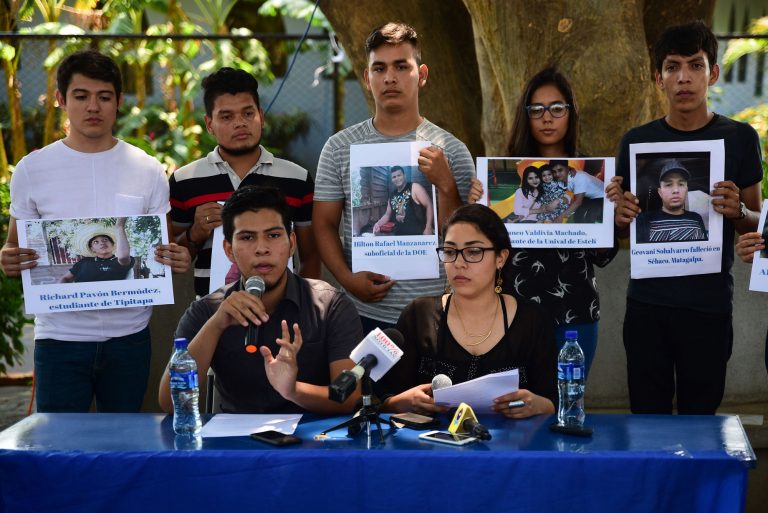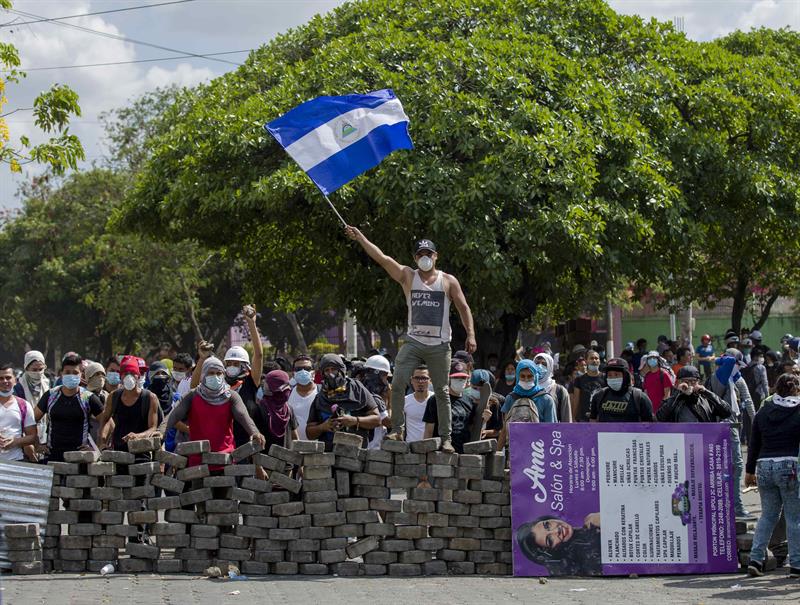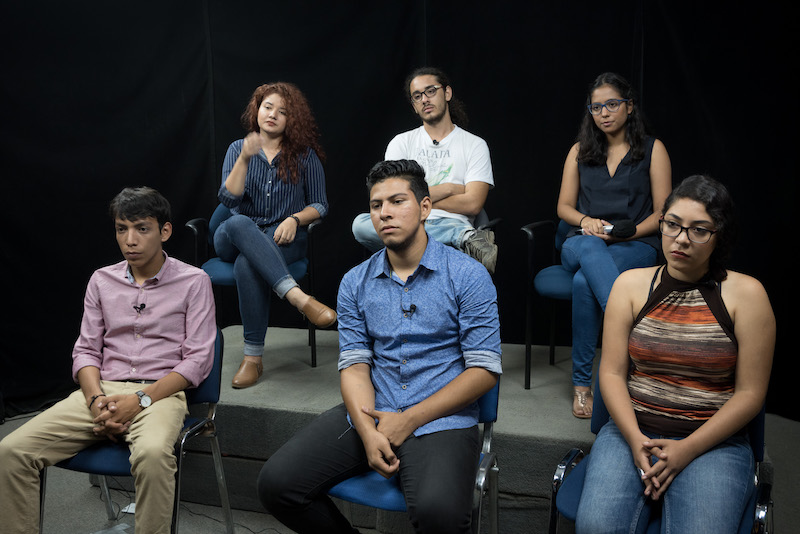2 de mayo 2018

Children of Exile: The Births “Sowing Hope” in the Camp of Nicaraguan Farmers

PUBLICIDAD 1M
PUBLICIDAD 4D
PUBLICIDAD 5D
They demand an Independent Truth Commission, punishment for the perpetrators and university autonomy.

The recent protests left a painful total of over 39 dead as the product of the repression. However, they also planted a “seed of hope” when the university students’ struggle unleashed a national civic rebellion.
But now – what are the demands and expectations of the self-convoked university student movement? To find out and hear their opinions, the television news program Esta Semana [“This week”] invited youth from different universities to participate on a panel moderated by journalist Carlos Fernando Chamorro. The young people spoke for over 30 minutes on the topics that they consider priorities in the national dialogue to which they’ve been invited by the Episcopal Conference.
Daniel Ortega’s exit from power via early elections; the creation of a Truth Commission made up of people outside the government; and a full investigation into the deaths of citizens killed in the protests, including punishment of the guilty, are all part of the students’ demands. In addition, their voices coincide in demanding the restitution of university autonomy which this authoritarian regime has violated.
Francisco Martinez, a student from the Nicaraguan National Autonomous University (UNAN) in Leon, assured that they’re currently formulating their requirements for the dialogue and building consensus, taking all of the universities into consideration.

Students on the fourth day of the protests against Daniel Ortega. Photo: Jorge Torres /EFE
“As basic points, we demand the exit of our current president, although, okay, we know it’s not going to happen. It’s assumed that Nicaragua should have a balance of powers, but this balance doesn’t exist. Everything is concentrated in just one family. While power continues in their hands, Nicaragua won’t have any stability, we’re not going to grow as an economy, human rights won’t be respected and we won’t have complete development in the country,” Martinez explained.
Moises Lopez, a student at the National Agrarian University (UNA), expressed that the objective of Nicaraguan society should be the citizens’ social demands. For these to be addressed, they need the unity of not only the university students themselves, but also of the professors and the general population, since this is the only way that the government can be forced to respect the laws.
The 19th of April University Movement brings together students from different universities in the country, including the Polytechnic University (UPOLI), the private University of Central America (UCA), the Agrarian (UNA) and the Engineering Universities (UNI), and many others.
Yaritzha Rostran mentioned that one of the demands they’ll be making is for measures to be taken against the students from the National Nicaraguan Students’ Union (UNEN) who betrayed their classmates by issuing false accusations to the press that those occupying the university weren’t students, but members of an opposition party, and that they were fabricating arms in the university. The students from the 19th of April movement want to reopen the elections process for the UNEN, since they don’t want the current leadership to continue in their positions.
“We want to break up this students’ organization (UNEN). They’re the ones that are causing chaos. We haven’t been able to effect a concrete dialogue within the universities because they’re trying to divide us. We think it’s only fair that they cease to exist as leaders,” emphasized Iskra Malespin of the University of Central America (UCA).
Moises Lopez of UNA, the Agrarian University, declared that the environmental issue should not be left out. “During the confusion of the protests, trucks were mobilized to the biological reserves and these then departed loaded with wood. So, as a first demand, we ask that they clarify through reports and data and joint investigations what’s going on in these ecological niches,” he pointed out.

Enrieth Martinez underlined the fact that you can’t go into a dialogue if the basic demands that the movement has been requesting since its inception aren’t taken up, such as the resignation of Ortega and punishment for those guilty of the repression. However, this student mentioned that she doesn’t believe that President Ortega and Vice President Rosario Murillo have heard their demands.
“Although these have been explicitly stated, it seems to me that they’re still talking about vandalism. They’re calling for a dialogue when the conditions aren’t there yet. We all agree that there’s going to be a dialogue, because we want peace. But all of the conditions need to be listened to,” said Enrieth, a student from the UCA.
Saul Verde from the American University stated that President Ortega should give the students the place they deserve and respect their ideals.
Enrieth Martinez affirmed that for the dialogue to be credible, parallel investigations should be carried out to bring to justice those responsible for the deaths during the protests. She also advocated for sectors that haven’t been recognized, such as the women’s and indigenous movements.
Last Thursday, the Attorney General’s office called a press conference for the media, both those allied with the government and the independent media. The purpose of his appearance was to announce the beginning of an investigation into the loss of lives among the students, members of the National Police and civilians, as well as the injuries to members of these groups.
Saul Verde from the American University said that the young people don’t feel represented by any of the state powers, beginning with the Judicial branch, and believe that the investigation announced won’t really function unless a Truth Commission is established with participation from the United Nations and the Inter-American Court of Human Rights.
“We’ve already seen cases that have been left with no resolution, and there’s no guarantee for us that this time the commission really is going to function. For that reason, there should be a Truth Commission,” Verde declared.
Although in the last several days peaceful marches have been held that were not repressed by the Ortega government, the university students don’t feel safe. They said that there’ve been infiltrators in these mobilizations, both members of the police and members of the Sandinista youth who don’t wear their distinctive t-shirts. These infiltrators try to provoke chaos and look for any moment of carelessness to inflict harm.
“There’re also inserting themselves into the directive bodies of all the universities to destabilize them. They’re making a show of peace and a cease fire, but we can’t believe this because there are still many people who haven’t appeared, and others who haven’t been freed and are still in the El Chipote jail. Threats also continue to the student leaders who participated in the protests,” Francisco Martinez asserted.
Moises Lopez added that respect for University Autonomy is the measure that would offer guarantees to the students that they’ll be able to return home without fear of being expelled from the universities.
“Every rector, every professor, all of us, have to keep watch first and foremost and set aside our personal interests, so that the future be shaped. That future is made up of all of us who still want to return to classes and be sure we can do so in peace,” reflected Lopez, adding that the majority of the students in the UNA are unhappy about the lack of participation of rector Telemaco Talavera. For this reason, they want to implement the university rules for new elections for representatives of the students’ union, the UNEN.
The principle demand of the students is the exit of Daniel Ortega. Even though they’re clear that this isn’t going to happen overnight, they consider it necessary that he abandon power in order for the country to reestablish equilibrium.
Francisco Martinez hopes that this can be obtained via the Constitution and the legal pathways. “He’s been in power since 2007. He’s a person with a lust for power and the desire to have it all. He never expected that all Nicaragua would tell him to go. He’s not going to leave right now, that’s a lie; it would be very naive to believe that he’ll just go away,” said Martinez.
With respect to this, Yaritzha Rostran stated that the Ortega government stopped being a constitutional government a long time ago. Now, they’re neither legal nor legitimate, and the important thing is that the population has found out. For now, legal measures are the best for getting him to leave power.
“We’re betting on a structural change. We know that the system in Nicaragua isn’t functioning, and reforms are being demanded. If this brings us to the destitution of this man from power, such measures need to be taken from the standpoint of legality and the popular demand. People have a voice and can demand,” concluded Enrieth Martinez.
Archivado como:
PUBLICIDAD 3M
Periodista. Investiga temas de medio ambiente, corrupción y derechos humanos. Premio a la Excelencia Periodística Pedro Joaquín Chamorro, Premio de Innovación Periodística Connectas, y finalista del premio IPYS en el 2018.
PUBLICIDAD 3D